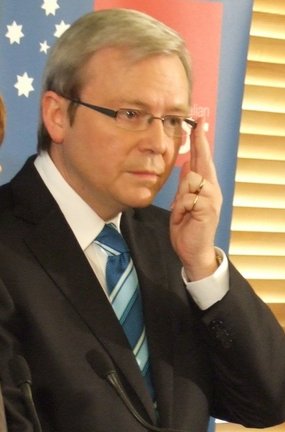Rudd Government to consider Indian nuke cooperation position, says Oz envoy
 New Delhi, Jan. 22: Reminding that Australia's new ruling Labor Party's nuclear policy is unlikely to change, Australian High Commissioner John McCarthy today said that Prime Minister Kevin Rudd's Government would consider India's request for civilian nuclear cooperation.
New Delhi, Jan. 22: Reminding that Australia's new ruling Labor Party's nuclear policy is unlikely to change, Australian High Commissioner John McCarthy today said that Prime Minister Kevin Rudd's Government would consider India's request for civilian nuclear cooperation.
Delivering a talk on "Australia's New Government and Asia" at Observer Research Foundation here, McCarthy said the Indian Prime Minister's Special Envoy, Shyam Saran, was in Australia last week and discussed the matter with officials.
Saying in politics one should never say never, McCarthy said: "The new Government is going to consider the Indian position," but added that it was "difficult" for the Government "to change the policy".
Maharajakrishna Rasgotra, Convenor of the National Security Advisory Board and President of the ORF Centre for International Affairs, requested the High Commissioner to put India's case in the right perspective in view of its non-proliferation track records and the need to change the NPT regime according to changing times.
McCarthy said there was a shift in the Australian nuclear policy after the Labor Party assumed power in the first week of December last year. The Rudd Government has overturned the policy of former Prime Minister John Howarth who had promised India uranium shipment.
McCarthy said uranium and liquid natural gas were the key promising areas for further strengthening economic cooperation between Australia and a rising India. But as far as uranium is concerned, there was a big problem because of the long drawn, strong anti-proliferation policies of the Labor Party, he said.
McCarthy said he was aware that this policy of not supplying uranium to India would have its impact on economic relations between the two countries, but said this should not be taken as a less liking or less respect for India.
Explaining Australia's anti-proliferation policies through decades, McCarthy said the nuclear issue, uranium and nuclear power were always big issues in Australia, and especially for the Labour Party. He noted that Australia itself does not use nuclear power and, it has no nuclear reactors.
Tracking down Australia's relations with Asian countries and trying to remove fears that the new Government might shift its focus to China, McCarthy said Prime Minister Rudd wants to improve Australia's relations with both India and China.
"He always speaks of India and China and China and India, and not China and after some time India," he said.
As far as Australia's two-day trade is concerned, India with 12 billion US dollars, is much below China (47 billion US dollars), Japan (48 billion US dollars) and US (44 billion dollars). However, India (with over 10 billion US dollars) stands at the fourth place as far as the Australian exports of merchandise is concerned, he said, and noted that with the dynamics changing and serious engagement at political level and strong economic relations, India and Australian relations can become much stronger.
The High Commissioner said there was also good scope for cooperation in the education sector, especially science and technology. He said though Australia attracted the second largest number of Indian students after the US, unfortunately most of the students were not going to the best of the Australian institutions.
The High Commissioner also spoke of new Australian Government's policy of shifting its strategic focus to south Pacific region to deal with the "arc of instability".
Unlike the John Howarth Government, the Labor Government has also decided to withdraw its combat forces numbering 550 personnel from Iraq, he said. However, the forces would remain in the Gulf, he said.
McCarthy said Australia's priority of fighting terrorism, however, would continue and hence its sharpened forces in Afghanistan would remain there.
Answering a question on the need to amend the NPT, McCarthy said there was no such demands from Australia though were such voices in the US, Europe and other countries.
Vikram Sood, former chief of Research and Analysis Wing and now Vice President of ORF Centre for International Affairs, observed that though India was not a signatory of the NPT, it has a very good track record of non-proliferation while China's case is the just opposite. McCarthy agreed with him. (ANI)